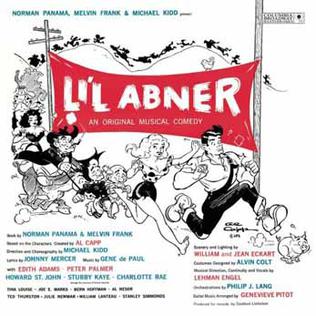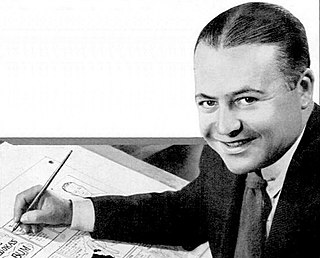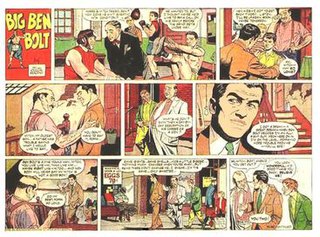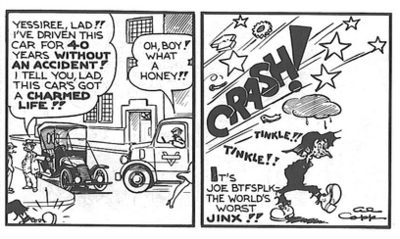
Alfred Gerald Caplin, better known as Al Capp, was an American cartoonist and humorist best known for the satirical comic strip Li'l Abner, which he created in 1934 and continued writing and drawing until 1977. He also wrote the comic strips Abbie an' Slats and Long Sam (1954). He won the National Cartoonists Society's Reuben Award in 1947 for Cartoonist of the Year, and their 1979 Elzie Segar Award, posthumously for his "unique and outstanding contribution to the profession of cartooning".

Li'l Abner was a satirical American comic strip that appeared in multiple newspapers in the United States, Canada, and Europe. It featured a fictional clan of hillbillies living in the impoverished fictional mountain village of Dogpatch, USA. Written and illustrated by Al Capp (1909–1979), the strip ran for 43 years, from August 13, 1934, through November 13, 1977. The Sunday page debuted on February 24, 1935, six months after the daily. It was originally distributed by United Feature Syndicate and later by the Chicago Tribune New York News Syndicate.

The shmoo is a fictional cartoon creature created by Al Capp (1909–1979); the character first appeared in the comic strip Li'l Abner on August 31, 1948. It has had a considerable influence on pop culture, language, geopolitics, human history, and science.

Li'l Abner is a 1956 musical with a book by Norman Panama and Melvin Frank, music by Gene De Paul, and lyrics by Johnny Mercer. Based on the comic strip Li'l Abner by Al Capp, the show is, on the surface, a broad spoof of hillbillies, but it is also a pointed satire on other topics, ranging from American politics and incompetence in the United States federal government to propriety and gender roles.

Sadie Hawkins Day is an American folk event and pseudo-holiday originated by Al Capp's hillbilly comic strip Li'l Abner (1934–1977). The annual comic strip storyline inspired real-world Sadie Hawkins events, the premise of which is that women ask men for a date or dancing. "Sadie Hawkins Day" was introduced in the comic strip on November 15, 1937; the storyline ran until the beginning of December. The storyline was revisited the following October/November, and inspired a fad on college campuses. By 1939, Life reported that 201 colleges in 188 cities held a Sadie Hawkins Day event.

Fearless Fosdick is a long-running parody of Chester Gould's Dick Tracy. It appeared intermittently as a strip-within-a-strip, in Al Capp's satirical hillbilly comic strip, Li'l Abner (1934–1977).

Dogpatch USA was a theme park located in northwest Arkansas along State Highway 7 between the cities of Harrison and Jasper, an area known today as Marble Falls. It was based on the comic strip Li'l Abner, created by cartoonist Al Capp and set in a fictional village called Dogpatch. The park opened in 1968, and closed in 1993.

Hammond Edward "Ham" Fisher was an American comic strip writer and cartoonist. He is best known for his long, popular run on Joe Palooka, which was launched in 1930 and ranked as one of the top five newspaper comics strips for several years.
Dogpatch was the fictional setting of cartoonist Al Capp's classic comic strip Li'l Abner (1934–1977).

Basil Wolverton was an American cartoonist and illustrator known for his intricately detailed grotesques of bizarre or misshapen people. Wolverton was described as "Producer of Preposterous Pictures of Peculiar People who Prowl this Perplexing Planet." His many publishers included Marvel Comics and Mad magazine.

A Sadie Hawkins dance or turnabout is a usually informal dance sponsored by a high school, middle school or college, to which the women invite the men. This is contrary to the custom of the men typically inviting the women to school dances such as prom in the spring and homecoming in the fall. These dances are primarily a United States event.
Eye dialect is a writer's use of deliberately nonstandard spelling either because they do not consider the standard spelling a good reflection of the pronunciation or because they are intending to portray informal or low-status language usage. The term was coined by George Philip Krapp to refer to a literary technique that implies the standard pronunciation of a given word that is not well-reflected by its standard spelling, such as wimmin to more accurately represent the typical English pronunciation of women. However, eye dialect is also commonly used to indicate that a character's speech is vernacular (nonstandard), foreign, or uneducated, often to be humorous. This form of nonstandard spelling differs from others in that a difference in spelling does not indicate a difference in pronunciation of a word. That is, it is dialect to the eye, rather than to the ear.

Abbie an' Slats is an American comic strip which ran from July 12, 1937, to January 30, 1971, initially written by Al Capp and drawn by Raeburn Van Buren. It was distributed by United Feature Syndicate.

Big Ben Bolt is a comic strip that was syndicated from February 20, 1950 to April 15, 1978. It was drawn by John Cullen Murphy, written by Elliot Caplin, and distributed by King Features Syndicate. The strip followed the adventures of boxer and journalist Ben Bolt.
Li'l Abner is a 1959 musical comedy film based on the comic strip of the same name created by Al Capp and the successful Broadway musical of the same name that opened in 1956. The film was produced by Norman Panama and directed by Melvin Frank. It was the second film to be based on the comic strip, the first being RKO's 1940 film, Li'l Abner.

Li'l Abner is a 1940 film based on the comic strip Li'l Abner created by Al Capp. The three most recognizable names associated with the film are Buster Keaton as Lonesome Polecat, Jeff York as Li'l Abner, and Milton Berle, who co-wrote the title song.
Toby Press was an American comic-book company that published from 1949 to 1955. Founded by Elliott Caplin, brother of cartoonist Al Capp and himself an established comic strip writer, the company published reprints of Capp's Li'l Abner strip; licensed-character comics starring such film and animated cartoon properties as John Wayne and Felix the Cat; and original conceptions, including romance, war, Western, and adventure comics. Some of its comics were published under the imprint Minoan. Some covers bore the logo ANC, standing for American News Company, at the time the country's largest newsstand distributor.
Robert Bartow Lubbers was an American comic strip and comic book artist best known for his work on such strips as Tarzan, Li'l Abner and Long Sam.
KickapooJoy Juice is a citrus-flavored soft drink brand owned by the Monarch Beverage Company. The name was introduced in Li'l Abner, a comic strip that ran from 1934 through 1977. Although Li'l Abner's Kickapoo Joy Juice was an alcoholic drink, the real world beverage is a lightly carbonated soft drink.
Li'l Abner: The Complete Dailies & Color Sundays, also known as The Complete Li'l Abner, is a series collecting the American comic strip Li'l Abner written and drawn by Al Capp, originally distributed by the syndicate United Feature Syndicate and later by Chicago Tribune New York News Syndicate, in total during 43 years before the strip ended. The strip debuted in August 1934 and at its peak, it had an estimated readership of over 60 million people regularly. The collection is published by The Library of American Comics.













